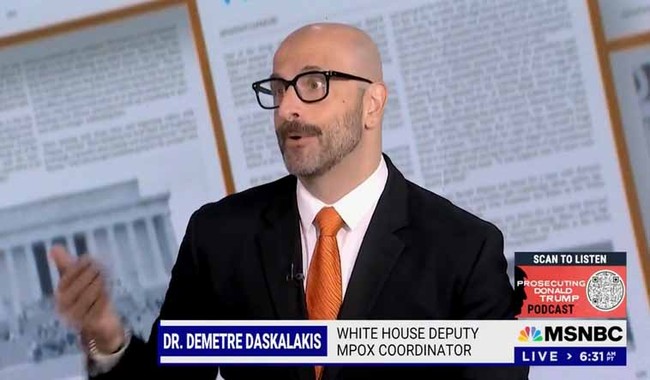Politics
CDC Doctor Resigns, Sparks Debate Over Language and Science

Demetre Daskalakis, a former official at the Centers for Disease Control and Prevention (CDC), has resigned, igniting discussions about the intersection of language, identity, and public health. In his resignation letter, Daskalakis criticized the direction of the CDC under the leadership of Robert F. Kennedy, Jr., referring to the organization’s approach as “unscientific.”
Daskalakis included the term “pregnant people” and his preferred pronouns in his letter, aiming to highlight his commitment to inclusivity and identity expression. He stated, “I very specifically use the term pregnant people, and very specifically added my pronouns at the end of my resignation letter to make the point that I am defying this terrible strategy at trying to erase people and not allowing them to express their identities.”
The reaction to Daskalakis’s resignation has been mixed, with critics arguing that his focus on language detracts from the fundamental role of the CDC in addressing public health crises. Some have pointed to his previous handling of the monkeypox outbreak as indicative of a broader issue. Daskalakis opted not to advise certain populations, specifically gay men, to abstain from sexual activity during the outbreak, stating his intention to “support people’s joy” rather than label behaviors as risky.
This decision has raised concerns about the balance between public health guidance and personal freedoms. Critics argue that such a stance undermines trust in scientific recommendations, particularly in an agency tasked with safeguarding public health.
Daskalakis’s approach to public health has sparked a debate on the role of personal ideology within government institutions. By prioritizing individual identity over traditional scientific parameters, he has drawn ire from those who believe that public health directives should remain strictly evidence-based.
As discussions continue regarding Daskalakis’s resignation and the implications for the CDC, many are questioning the agency’s future direction. The controversy has highlighted a division in public health philosophy—one that weighs scientific rigor against evolving societal values.
The resignation serves as a bellwether for ongoing discussions about how language and identity politics intersect with public health initiatives. As the CDC faces increasing scrutiny, the focus remains on how the agency will navigate these complex issues moving forward.
-

 Lifestyle4 months ago
Lifestyle4 months agoLibraries Challenge Rising E-Book Costs Amid Growing Demand
-

 Sports3 months ago
Sports3 months agoTyreek Hill Responds to Tua Tagovailoa’s Comments on Team Dynamics
-

 Sports3 months ago
Sports3 months agoLiverpool Secures Agreement to Sign Young Striker Will Wright
-

 Lifestyle3 months ago
Lifestyle3 months agoSave Your Split Tomatoes: Expert Tips for Gardeners
-

 Lifestyle3 months ago
Lifestyle3 months agoPrincess Beatrice’s Daughter Athena Joins Siblings at London Parade
-

 World3 months ago
World3 months agoWinter Storms Lash New South Wales with Snow, Flood Risks
-

 Science4 months ago
Science4 months agoTrump Administration Moves to Repeal Key Climate Regulation
-

 Science3 months ago
Science3 months agoSan Francisco Hosts Unique Contest to Identify “Performative Males”
-

 Business4 months ago
Business4 months agoSoFi Technologies Shares Slip 2% Following Insider Stock Sale
-

 Science4 months ago
Science4 months agoNew Tool Reveals Link Between Horse Coat Condition and Parasites
-

 Sports4 months ago
Sports4 months agoElon Musk Sculpture Travels From Utah to Yosemite National Park
-

 Science4 months ago
Science4 months agoNew Study Confirms Humans Transported Stonehenge Bluestones









